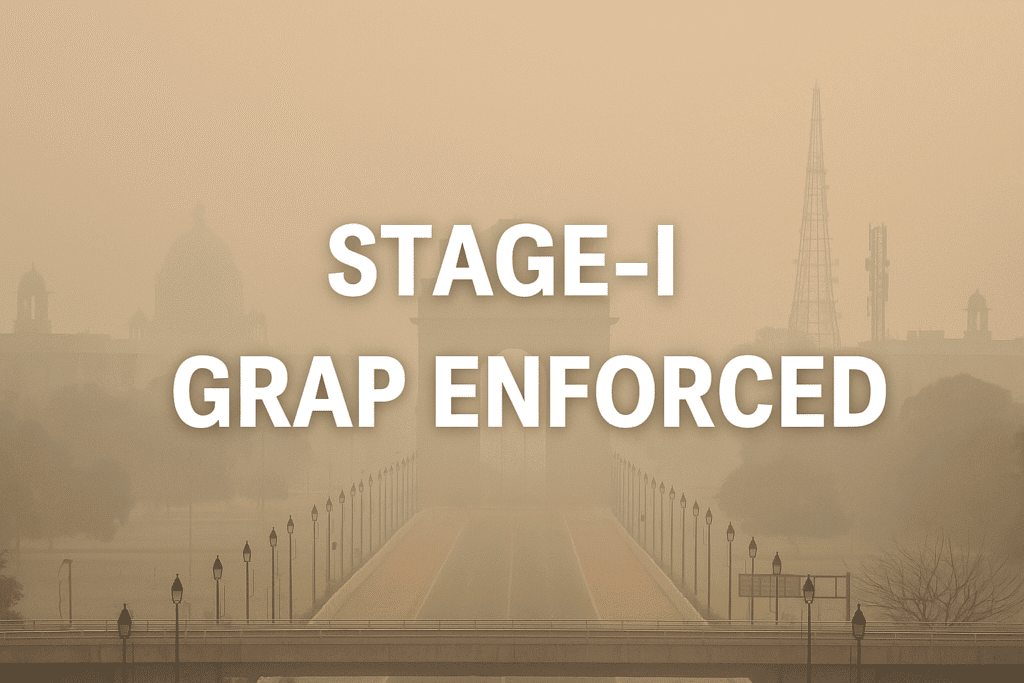New Delhi: With Delhi’s daily average Air Quality Index (AQI) reaching 211 (‘Poor’ category), the Commission for Air Quality Management (CAQM) has invoked Stage-I of the Graded Response Action Plan (GRAP) across the entire National Capital Region (NCR). The decision follows a detailed review by the CAQM Sub-Committee, which met to assess the worsening air quality situation and implement preventive measures to stop further deterioration.

Under Stage-I, a 27-point action plan has been enforced with immediate effect. The plan mandates strict compliance and monitoring by various implementing agencies, including Pollution Control Boards of NCR states and the Delhi Pollution Control Committee (DPCC). The focus is on controlling dust, curbing industrial and vehicular emissions, and promoting citizen participation in pollution mitigation efforts.
Citizen Responsibilities Under Stage-I GRAP
The CAQM has urged citizens to actively cooperate by following key measures such as:
- Keeping vehicle engines properly tuned and maintaining tyre pressure.
- Ensuring up-to-date Pollution Under Control (PUC) certificates.
- Turning off vehicle engines at red lights and avoiding idling.
- Preferring hybrid or electric vehicles to reduce vehicular pollution.
- Reporting polluting activities through the 311 App, Green Delhi App, or SAMEER App.
- Celebrating festivals in an eco-friendly manner and avoiding firecrackers.
Key Directives in the 27-Point Action Plan
Some major steps to be strictly implemented under Stage-I include:
- Dust Control & Construction: Enforcing dust mitigation norms at all Construction and Demolition (C&D) sites, with remote monitoring via state portals. Projects of 500 sqm or above not registered or non-compliant will be stopped.
- Waste Management: Regular lifting of municipal, C&D, and hazardous waste, and ensuring no illegal dumping in open areas.
- Road Management: Mechanized sweeping, water sprinkling, and anti-smog guns on roads and at construction sites to suppress dust.
- Vehicular Emissions: Strict enforcement of PUC norms, impounding of visibly polluting vehicles, and diversion of non-destined trucks through the Eastern and Western Peripheral Expressways.
- Industrial Regulation: Monitoring of industrial emissions, ensuring use of approved clean fuels, and closing non-compliant or illegal units, including brick kilns and hot mix plants.
- Public Awareness: Active dissemination of information via social media, bulk SMS, and apps to help citizens report violations.
- Energy Use: Ensuring hotels and eateries use electricity or gas-based appliances instead of coal or firewood.
- Traffic and Office Management: Deploying police for smooth traffic flow and encouraging unified employee commuting to reduce congestion.
Continuous Monitoring and Review
The Sub-Committee has stated that the air quality situation will be closely monitored and reviewed regularly, with future decisions to be taken based on real-time air quality data and forecasts from IMD and IITM.
The comprehensive GRAP schedule and citizen charter are available on the CAQM’s official website: https://caqm.nic.in
Also Read: DDA and NSD Collaborate to Transform Delhi Parks into Creative Community Hubs
